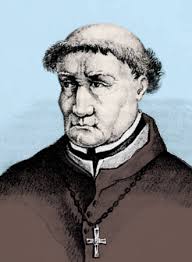 Long
did old-fashioned English Protestants and other anti-Catholics put their attention
upon words such as “jesuitical,” “popish,” “jansenistic,” and “inquisitorial”
in their polemics. But possibly the most odious, and the most successfully repromoted,
is the idea of the hated Inquisition as the cruel tool of the Catholic Church
to crush its enemies. By this means, especially for English-speakers, Catholic
Spain was portrayed as the arch-enemy of all Protestantism. In the United States,
whether it be the vulgarized Chick comics, or the sophisticated Ivy League intellectuals
in 1960 who feared the Kennedy campaign, the Inquisition is generally assumed
to be the Roman part of the triad denounced by clergyman Samuel Dickinson Burchard in 1884 in the famed expression “Rum, Romanism, and Rebellion.” American Know-Nothings
and John Foxe’s Book of Martyrs constantly reprinted, or even the purveyors of
the post-1968 sexual revolution or abortion-on-demand today, bring up the ghost
of the Inquisition to suit their diverse purposes. But what do they know of its
history? Are they aware the Inquisition was never primarily an anti-Protestant
body, and that Philip II of Spain never had a consistently anti-Protestant foreign
policy? Is it clear that most countries had their own equivalent structure for
judging heresy, with no need to import anything similar from Spain, whether the
would-be importer were Catholic or Protestant? How many remember that anti-Spanish
feeling ran high in Italy where the Spanish Inquisition was ridiculed — and
where Italian Catholics scorned the idea of racial purity? “It is one of the features
of inquisitorial history that its practitioners have consistently failed to compare
the Spanish Inquisition to comparable courts elsewhere in sixteenth-and seventeenth-century
Europe.”Distinctions are still often not made between the Roman (and purely
ecclesiastical) Inquisition, and the Spanish secular-ecclesiastical “dual” Inquisition
whose famous administrator was the Dominican Tomás de Torquemada. His career as
Grand Inquisitor (sole control was never his — he shared it with other “heads”)
ended with his death in 1498, well before the advent of Luther and Calvin. Most
often with no elucidating context, the Inquisition is assumed to be a weapon of
the Catholic Church against all heretics, in whatever age, even though its somewhat
mild ecclesiastical form was originally set up after 1232 to deal with the Cathars or Albigensians in late medieval France. Or, it is seen as the sole reason
for the downfall of Spain itself in later centuries.
Long
did old-fashioned English Protestants and other anti-Catholics put their attention
upon words such as “jesuitical,” “popish,” “jansenistic,” and “inquisitorial”
in their polemics. But possibly the most odious, and the most successfully repromoted,
is the idea of the hated Inquisition as the cruel tool of the Catholic Church
to crush its enemies. By this means, especially for English-speakers, Catholic
Spain was portrayed as the arch-enemy of all Protestantism. In the United States,
whether it be the vulgarized Chick comics, or the sophisticated Ivy League intellectuals
in 1960 who feared the Kennedy campaign, the Inquisition is generally assumed
to be the Roman part of the triad denounced by clergyman Samuel Dickinson Burchard in 1884 in the famed expression “Rum, Romanism, and Rebellion.” American Know-Nothings
and John Foxe’s Book of Martyrs constantly reprinted, or even the purveyors of
the post-1968 sexual revolution or abortion-on-demand today, bring up the ghost
of the Inquisition to suit their diverse purposes. But what do they know of its
history? Are they aware the Inquisition was never primarily an anti-Protestant
body, and that Philip II of Spain never had a consistently anti-Protestant foreign
policy? Is it clear that most countries had their own equivalent structure for
judging heresy, with no need to import anything similar from Spain, whether the
would-be importer were Catholic or Protestant? How many remember that anti-Spanish
feeling ran high in Italy where the Spanish Inquisition was ridiculed — and
where Italian Catholics scorned the idea of racial purity? “It is one of the features
of inquisitorial history that its practitioners have consistently failed to compare
the Spanish Inquisition to comparable courts elsewhere in sixteenth-and seventeenth-century
Europe.”Distinctions are still often not made between the Roman (and purely
ecclesiastical) Inquisition, and the Spanish secular-ecclesiastical “dual” Inquisition
whose famous administrator was the Dominican Tomás de Torquemada. His career as
Grand Inquisitor (sole control was never his — he shared it with other “heads”)
ended with his death in 1498, well before the advent of Luther and Calvin. Most
often with no elucidating context, the Inquisition is assumed to be a weapon of
the Catholic Church against all heretics, in whatever age, even though its somewhat
mild ecclesiastical form was originally set up after 1232 to deal with the Cathars or Albigensians in late medieval France. Or, it is seen as the sole reason
for the downfall of Spain itself in later centuries.
For the complete overview , reading order, and historical context, see the full guide.
No comments:
Post a Comment